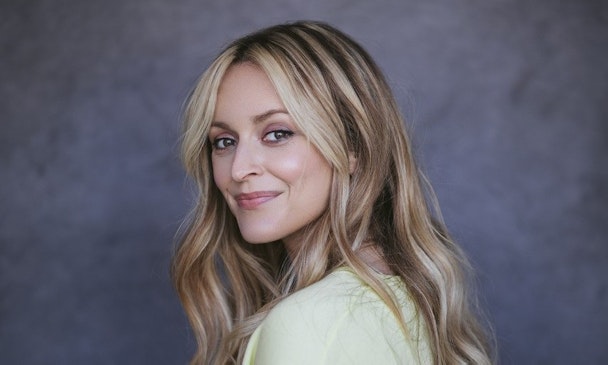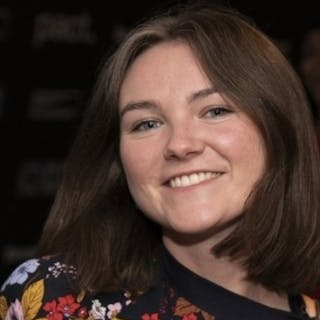‘As long as I’m creating, I’m happy’: Fearne Cotton on life after TV
The former TV presenter talks to The Drum as part of our Entertainment Focus, sharing how she has been creating content on her terms since being freed from the ‘toxic’ pressures of the entertainment industry.

Fearne Cotton opens up about her life in entertainment / Alex Cameron
Happy Place is an all-encompassing wellness brand that owns festivals, podcasts, clothing and beauty ranges, books and even an in-house studio. It is the brainchild of presenter and broadcaster Fearne Cotton, who, after 25 years in the “toxic” TV industry, found solace as a brand owner.
Cotton began her career in entertainment in 1997, aged just 15. She proved her presenting credentials in kids’ TV before moving into prime-time telly, hosting the BBC show Top of the Pops and as a regular on the ITV comedy panel show Celebrity Juice. For much of the 00s, Cotton was the go-to presenter for many of the biggest shows on British TV.
“My initiation into the world of TV was really exciting: I was a kid; I was missing school to go and be on the TV; it was a dream come true,” she says, but adds: “It probably wasn’t until I was in my 20s that I started getting that slight ick and feeling of discomfort.”
Underneath her successful TV career, Cotton struggled with the “treacherous” and “toxic” side of the industry. “You are very disposable and you can get sacked without being told and I started to find it quite challenging being pitted against other people.”
Advertisement
Things came to a head after Cotton found herself in a period of low mental health and was searching for a way out. The seeds of Happy Place started from Cotton’s first book, Happy, which subsequently led to a podcast called Happy Place. The podcast launched in 2018, just as podcasting began to enter the mainstream, and many of its early guests didn’t understand what a podcast was, admits Cotton.
“That was just an experiment because I didn’t know what else to do. There was no eureka moment of ’I’ll start a brand!’”
From TV presenter to brand boss
Six years after birthing Happy Place, Cotton’s brand now includes two festivals (one in Tatton Park and one in Chiswick House), an app, a YouTube series, multiple books and a book club, a kids’ TV show on Sky and an in-house studio. As well as content, Happy Place sells wellness products like bath oils and pillow mists through UK retailer Boots and has a clothing collaboration with Nobody’s Child.
“90% of my time now is thinking about Happy Place as a brand and how we’re going to continue to expand it and also just the day-to-day relentlessness of all the different plates that were spinning at the moment. I’m so much about business and brand every day and that keeps me excited and motivated.”
Advertisement
Although running a brand with many different tentacles can be “full-on,” ultimately, Cotton is happier and healthier. “I don’t have that awful panic feeling of being judged about my performance constantly.”
An element of her previous career Cotton exuberates affection for is interviewing. “I love it. It feels like my real comfort zone in a healthy way.” The Happy Place podcast is now on its 270th episode and counts the likes of Hilary Clinton, Dave Grohl and Dua Lipa as guests.
Despite honing her interview skills for over 25 years, Cotton reveals she still gets nervous. “Sometimes I’m shitting myself if it’s someone that is very esteemed and I never really know where the conversation is going to go – they might be in a chatty mood or go off on a tangent I have no clue about, so it keeps me on my toes. There is always room to do it better and I love that.”
Freedom from TV gatekeepers
Cotton is dipping her toes back on screen through the recently launched YouTube series What Is, How To. The concept for the show is about providing free therapy with mental health experts. “This felt like a really simple idea to me and one that we can action quickly and one that will hopefully be helpful.”
Happy Place was late to the YouTube party, Cotton admits, as her team has struggled to work out what a video version should look like. That question has also led Cotton to push back on TV production companies that have contacted her for development ideas. “I just can’t find the idea that makes me feel comfortable and that it would be doing good,” she says. “It has to be meaningful and not being for the sake of it.”
Now, though, Cotton says she is more than happy using YouTube and the podcast to get good stories out there. “I don’t feel this desperate need to get into TV.”
Suggested newsletters for you
The Happy Place studio also gives the company the freedom to produce and publish content without the usual gatekeepers in TV. “It gives us the chance to make something quite quickly and not bin it because it’s not working on day one. The harsh realities of TV today and the fact their budgets are diminishing by the second if something doesn’t work on day one, it never sees the light of day, whereas we can keep something rumbling and all on YouTube.”
What’s next for Happy Place?
Mulling over her longer-term ambitions for Happy Place, Cotton shares that she would love a permanent physical Happy Place, but what that might look like she hasn’t mapped out yet. Then there is also a pipe dream to one day produce TV shows adapted from books, although she adds: “That’s a long road and one I’m prepared to walk down slowly.”
In the meantime, Cotton wants to expand her headcount to execute all of her many plans and give other content creators a platform through her Happy Place Studio. As someone who struggles with being “stagnant,” Cotton is thriving by growing her brand.
“I would like to keep working for as long as I possibly can. I’m not one of those people who can’t wait to retire and move to Ibiza. For me, creativity is joy; that is my happiness; as long as I’m creating, I’m happy.”
Watch the full interview below

